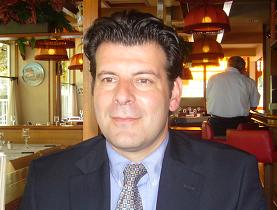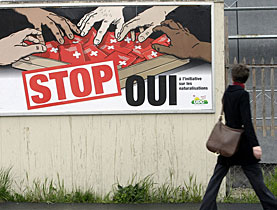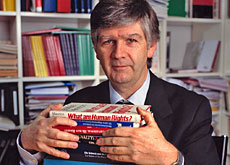Switzerland raises its human rights presence

A three-week session of the United Nations Human Rights Council has begun in Geneva.
For the first time the Swiss delegation is being headed by a specially appointed representative rather than the head of the Swiss mission to the UN in Geneva, as has been the case up to now.
Also new is the UN high commissioner for human rights, the South African Navanethem Pillay, who replaced Louise Arbour last week.
The Swiss representative is Roberto Balzaretti, whose appointment was announced last week.
A trained lawyer, he was the personal adviser to Swiss Foreign Minister Micheline Calmy-Rey until December 2007.
Ahead of the first session on Monday, Balzaretti told swissinfo about his expectations in his new job and the challenges he faces.
swissinfo: What exactly will your role be in the council?
Roberto Balzaretti: I am my country’s ambassador to this council, in the sense of being the one who takes the message, listens to the messages of the others and takes them back home, so that together we understand the cause of human rights and can move it forward.
swissinfo: The fact that Switzerland has appointed a special representative to the council suggests that it is expecting a lot from it. How do you see the council evolving?
RB: Switzerland worked very hard to set up this body. From the beginning we wanted a strong, independent body, but at the same time an area where it is possible to hold a non-conflictual discussion about the way in which human rights are being respected, and how this can be improved.
But there are some principles where you cannot compromise, which have to be respected. We don’t want to pick on anyone, we want to resolve problems through dialogue.
The council is a young body. You have to be ambitious about achieving certain aims, but you also have to be patient if this takes a bit longer than you thought.
swissinfo: Will the non-governmental organisations find an ally in you to improve what they do?
R.B.: As far as we are concerned, civil society is very important in monitoring respect for human rights and in helping to ensure they are respected. Procedural questions about when and how this is to be done are open for discussion. What is important for me is that the way the council works shouldn’t limit the chances the NGOs have of getting their voices heard.
swissinfo: How do you see Switzerland’s image within the Human Rights Council?
R.B.: I think our image is that of a country which respects the principles, which attaches importance to international law, which doesn’t have a hidden political agenda, and which takes an objective position with regards to respecting the law. This has sometimes earned us criticism because when you are committed to respecting the law objectively you can sometimes annoy some of your friends.
But it is precisely this philosophy which must win through. It is precisely when among friends that you must be able to say things clearly. I think that is the image which Switzerland enjoys in the world in general, and in Geneva, and it’s one that I like and which I hope to be able to strengthen.
swissinfo: Given that you have a legal background, that you are used to applying the law, or to seeing whether the law has been applied or not, isn’t it a challenge to go to a multilateral area where you have to negotiate, where you are faced with other mentalities and cultures, other ways of managing political and public affairs?
R.B.: When you must take into account the fact that others may see things differently from you and that they aren’t necessarily wrong, that is a challenge for everyone. But that is the beauty of this work, that you can sit down at a table and have a dialogue and reach a common position.
But I have been a lawyer for long enough to know that the law cannot solve all issues. If the law is not backed by an idea of justice and of good faith, the law will not solve the problem. You have to do both. You have to find solutions which respect certain fundamental principles – you can’t keep challenging the Universal Declaration of Human Rights – but you also have to find solutions which are viable, which respect the opinions of others. That’s the challenge.
swissinfo-interview: Mohamed Cherif
The Human Rights Council was set up in 2006 to replace the Commission on Human Rights.
The old commission was criticised as one-sided, since some of its members were regarded as flagrant abusers of human rights.
However, the council has also failed to pass resolutions condemning human rights abuses by certain countries.
The council is a subsidiary body of the UN General Assembly.
Its 47 seats are distributed about the UN’s regional groups.
Membership is for three years; Switzerland’s mandate expires in 2009.
The council has no authority except to make recommendations to the General Assembly.
Roberto Balzaretti was born in 1965 in the Italian-speaking canton of Ticino.
He studied law at Bern university and joined the foreign ministry in 1991.
In 2003 he became deputy head of the foreign ministry’s international law and humanitarian law division.
The following year he was made personal adviser to Foreign Minister Micheline Calmy-Rey, a role he maintained until December 2007.
He left the foreign ministry to take up a position in the Credit Suisse bank, but stayed for only eight months.

In compliance with the JTI standards
More: SWI swissinfo.ch certified by the Journalism Trust Initiative



You can find an overview of ongoing debates with our journalists here. Please join us!
If you want to start a conversation about a topic raised in this article or want to report factual errors, email us at english@swissinfo.ch.